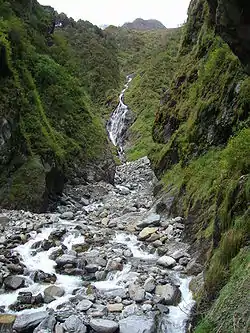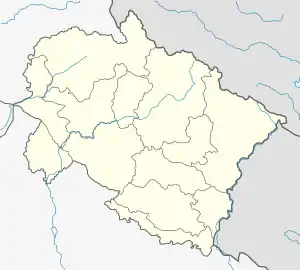Yamunotri
Yamunotri is the source of the Yamuna River and the seat of the Goddess Yamuna in Hinduism. It is situated at an altitude of 3,293 metres (10,804 ft) in the Garhwal Himalayas and located approximately 30 kilometers (19 mi) North of Uttarkashi, the headquarters of the Uttarkashi district in the Garhwal Division of Uttarakhand, India. It is one of the four sites in India's Chhota Char Dham pilgrimage. The sacred shrine of Yamunotri, source of the river Yamuna, is the westernmost shrine in the Garhwal Himalayas, perched atop a flank of Bandar Poonch Parvat. The chief attraction at Yamunotri is the temple devoted to the Goddess Yamuna and the holy thermal springs at Janki Chatti (7 km. Away).
Yamunotri | |
|---|---|
Glacier | |
 Yamuna River at Yamunotri | |
 Yamunotri  Yamunotri | |
| Coordinates: 31.01°N 78.45°E | |
| Country | India |
| State | Uttarakhand |
| District | Uttarkashi |
| Vehicle registration | UK |
| Website | uk |
The actual source, a frozen lake of ice and glacier (Champasar Glacier) located on the Kalind Mountain at a height of 4,421 m above sea level, about 1 km further up, is not frequented generally as it is not accessible; hence the shrine has been located on the foot of the hill. The approach is extremely difficult and pilgrims therefore offer puja at the temple itself.

The temple of Yamuna, on the left bank of the Yamuna, was constructed by Maharaja Pratap Shah of Tehri Garhwal. The deity is made of black marble. The Yamuna, like the Ganges, has been elevated to the status of a divine mother for the Hindus and has been held responsible for nurturing and developing the Indian civilization.
Close to the temple are hot water springs gushing out from the mountain cavities. Surya Kund is the most important kund. Near the Surya Kund there is a shila called Divya Shila, which is worshipped before puja is offered to the deity. Devotees prepare rice and potatoes, tied in muslin cloth, to offer at the shrine by dipping them in these hot water springs. Rice so cooked is taken back home as prasadam. The pujaris of Yamunotri come from the village of Kharsali near Janki Chatti. They are the administrators of the sacred place and perform religious rites. They are well-versed in the Shastras.

History and legends

According to the ancient legend, sage Asit Muni had his hermitage here. All his life, he bathed daily both in the Ganges and the Yamuna. Unable to go to Gangotri during his old age, a stream of the Ganges appeared opposite Yamunotri for him.
The temple and the place opens every year on the auspicious day of the Akshaya Tritiya, which generally falls during the last week of April, or the first week of May. The temple always closes on the sacred day of Diwali in mid-October - first week of November, with a brief ceremony. The temple staff return to their villages and for the rest of the time the valley is gripped in no-man silence and covered with a white sheet of snow. With the melting of the snow next summer, the temple re-opens.
Sangya is the birthplace of the Yamuna in the Champasar Glacier (4,421 m) just below the Banderpoonch Mountain. The mountain adjacent to the river source is dedicated to her father, and is called Kalind Parvat, (Kalind being another name for the sun deity - Surya). Yamuna is known for her frivolousness, a trait that she developed because, according to a common story, Yamuna's mother could never make eye contact with her dazzling husband.
Geography
Yamunotri is located at 31.01°N 78.45°E.[1] It has an average elevation of 3,954 metres (12,972 ft).
Yamuna River
The actual source of Yamuna River lies in the Yamunotri Glacier, at a height 6,387 metres (20,955 ft), near the Bandarpunch peaks in the Lower Himalayas and is dedicated to goddess Yamuna.[2] It crosses the states of Uttarakhand, Haryana, Uttar Pradesh, Himachal Pradesh and later Delhi before merging with the Ganges at Triveni Sangam, Prayagraj.
Yamunotri Temple
Yamunotri Temple is situated in the western region of Garhwal Himalayas at an altitude of 3,235 metres (10,614 ft) near the river source.[3] The original temple was built by Maharani Guleria of Jaipur in the 19th century. The current temple is of recent origin as earlier constructions have been destroyed by weather and the elements. There seems to be a confusion as to who built the temple of Yamunotri. However, according to sources, the temple was originally constructed by Maharaja Pratap Shah of Tehri Garhwal.
Timings
- Opening hours: 6 am – 8 pm; 1st week of May - Till Diwali (October)
- Aarti time: 6:30 pm – 7:30 pm
See also
References
- Falling Rain Genomics, Inc - Yamunotri
- Jain, Sharad K.; Pushpendra K. Agarwal; Vijay P. Singh (2007). Hydrology and water resources of India- Volume 57 of Water science and technology library. Springer. pp. 344–354. ISBN 978-1-4020-5179-1.
- India9.com. "India9.com:Yamunotri".
| Wikimedia Commons has media related to Yamunotri. |



